
Galaxy Quest is a 1999 American science fiction comedy film directed by Dean Parisot and written by David Howard and Robert Gordon. A parody of and homage to science-fiction films and series, especially Star Trek and its fandom, the film depicts the cast of a fictional cult television series, Galaxy Quest, who are drawn into a real interstellar conflict by actual aliens who think the series is an accurate documentary. It stars Tim Allen, Sigourney Weaver, Alan Rickman, Tony Shalhoub, Sam Rockwell, and Daryl Mitchell. The film was a modest box office success and positively received by critics: It won the Hugo Award for Best Dramatic Presentation and the Nebula Award for Best Script. It was also nominated for 10 Saturn Awards, including Best Science Fiction Film and Best Director for Parisot, Best Actress for Weaver, and Best Supporting Actor for Rickman, with Allen winning Best Actor.
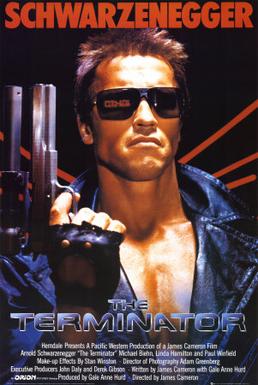
The Terminator is a 1984 American science fiction action film directed by James Cameron. It stars Arnold Schwarzenegger as the Terminator, a cybernetic assassin sent back in time from 2029 to 1984 to kill Sarah Connor, whose unborn son will one day save mankind from extinction by Skynet, a hostile artificial intelligence in a post-apocalyptic future. Kyle Reese is a soldier sent back in time to protect Sarah. The screenplay is credited to Cameron and producer Gale Anne Hurd, while co-writer William Wisher Jr. received an "additional dialogue" credit.
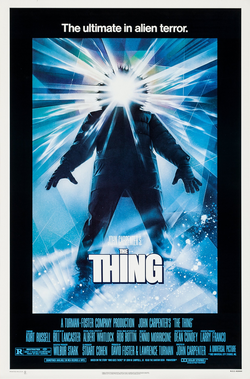
The Thing is a 1982 American science fiction horror film directed by John Carpenter from a screenplay by Bill Lancaster. Based on the 1938 John W. Campbell Jr. novella Who Goes There?, it tells the story of a group of American researchers in Antarctica who encounter the eponymous "Thing", an extraterrestrial life-form that assimilates, then imitates, other organisms. The group is overcome by paranoia and conflict as they learn that they can no longer trust each other and that any of them could be the Thing. The film stars Kurt Russell as the team's helicopter pilot R.J. MacReady, with A. Wilford Brimley, T. K. Carter, David Clennon, Keith David, Richard Dysart, Charles Hallahan, Peter Maloney, Richard Masur, Donald Moffat, Joel Polis, and Thomas G. Waites in supporting roles.

John Howard Carpenter is an American filmmaker and composer. Most commonly associated with horror, action, and science fiction films of the 1970s and 1980s, he is generally recognized as one of the greatest masters of the horror genre. At the 2019 Cannes Film Festival, the French Directors' Guild gave him the Golden Coach Award, lauding him as "a creative genius of raw, fantastic, and spectacular emotions".

Jeffrey Leon Bridges is an American actor. He is known for his leading man roles in film and television. In a career spanning over seven decades he has received various accolades, including an Academy Award, a Golden Globe, and a Screen Actors Guild Award in addition to nominations for three BAFTA Awards and two Emmy Awards. In 2019 he was awarded the Cecil B. DeMille Award.

The Day the Earth Stood Still is a 1951 American science fiction film from 20th Century Fox, produced by Julian Blaustein and directed by Robert Wise. It stars Michael Rennie, Patricia Neal, Hugh Marlowe, Sam Jaffe, Billy Gray, Frances Bavier and Lock Martin. The screenplay was written by Edmund H. North, based on the 1940 science fiction short story "Farewell to the Master" by Harry Bates. The film score was composed by Bernard Herrmann. Set in the Cold War during the early stages of the nuclear arms race, the storyline involves a humanoid alien visitor who comes to Earth, accompanied by a powerful robot, to deliver an important message that will affect the entire human race. In 1995, the film was selected for preservation in the United States National Film Registry as "culturally, historically, or aesthetically significant".

The Thing from Another World, sometimes referred to as just The Thing, is a 1951 American black-and-white science fiction-horror film, directed by Christian Nyby, produced by Edward Lasker for Howard Hawks' Winchester Pictures Corporation, and released by RKO Radio Pictures. The film stars Margaret Sheridan, Kenneth Tobey, Robert Cornthwaite, and Douglas Spencer. James Arness plays The Thing. The Thing from Another World is based on the 1938 novella "Who Goes There?" by John W. Campbell.

Men in Black is a 1997 American science fiction action comedy film based on the comic series by Marvel Comics, which was itself based on the conspiracy theory. Produced by Columbia Pictures and Amblin Entertainment in association with MacDonald Parkes Productions, and distributed by Sony Pictures Releasing, it is the first installment in the Men in Black franchise. Directed by Barry Sonnenfeld from a screenplay and screen story written by Ed Solomon, it stars Tommy Lee Jones and Will Smith in the lead roles, with Linda Fiorentino, Vincent D'Onofrio, and Rip Torn in supporting roles. In the film, Kevin Brown / Agent K (Jones) and James Darrell Edwards III / Agent J (Smith) investigate a series of seemingly unrelated criminal incidents related to the extraterrestrial lifeforms which live in secret on Earth.
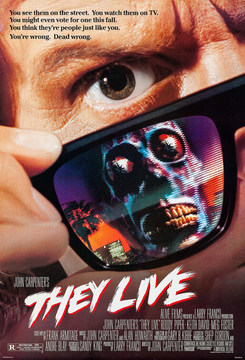
They Live is a 1988 American science fiction action horror film written and directed by John Carpenter, based on the 1963 short story "Eight O'Clock in the Morning" by Ray Nelson. Starring Roddy Piper, Keith David, and Meg Foster, the film follows an unnamed drifter who discovers through special sunglasses that the ruling class are aliens concealing their appearance and manipulating people to consume, breed, and conform to the status quo via subliminal messages in mass media.

Starman is an American science fiction television series starring Robert Hays and Christopher Daniel Barnes which continues the story from the 1984 film of the same name. The series aired on ABC from September 19, 1986, to May 2, 1987.

Fire in the Sky is a 1993 American biographical science fiction mystery film directed by Robert Lieberman and adapted by Tracy Tormé. It is based on Travis Walton's book The Walton Experience, which describes an extraterrestrial abduction. The film stars D. B. Sweeney as Walton, and Robert Patrick as his best friend and future brother-in-law, Mike Rogers. James Garner, Craig Sheffer, Scott MacDonald, Henry Thomas and Peter Berg also star.
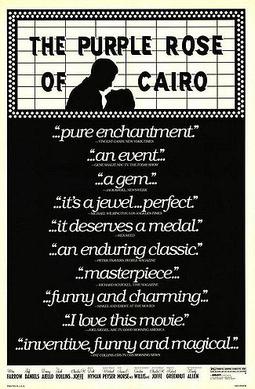
The Purple Rose of Cairo is a 1985 American fantasy-romantic film written and directed by Woody Allen, and starring Mia Farrow, Jeff Daniels, and Danny Aiello. Inspired by the films Sherlock Jr. (1924) and Hellzapoppin' (1941) and Pirandello's play Six Characters in Search of an Author (1921), it is the tale of a film character named Tom Baxter who leaves a fictional film of the same name and enters the real world.
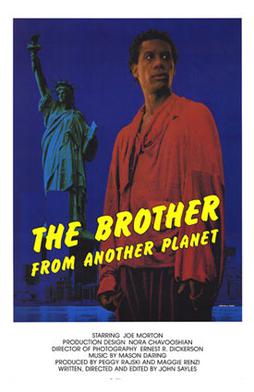
The Brother from Another Planet is a 1984 low-budget American science fiction film, written and directed by John Sayles.

Dark Star is a 1974 American science fiction comedy film produced, scored and directed by John Carpenter and co-written with Dan O'Bannon. It follows the crew of the deteriorating starship Dark Star, twenty years into their mission to destroy unstable planets that might threaten future colonization of other planets.
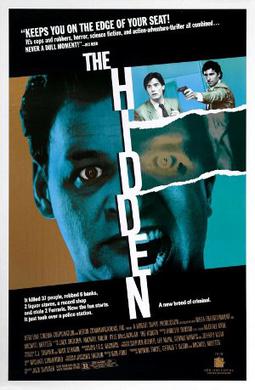
The Hidden is a 1987 American science fiction film directed by Jack Sholder, written by Jim Kouf, and released by New Line Cinema. It stars Kyle MacLachlan and Michael Nouri, along with Clu Gulager, Chris Mulkey, Ed O'Ross, Clarence Felder, Claudia Christian and Larry Cedar, and received mostly positive reviews. A sequel, The Hidden II, was directed by Seth Pinsker and released in 1993.
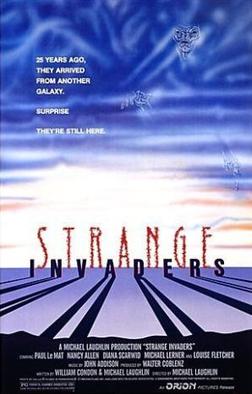
Strange Invaders is a 1983 American science fiction film directed and co-written by Michael Laughlin, and stars Paul Le Mat, Nancy Allen and Diana Scarwid.

Lifted is a 2006 American animated science fiction short film written and directed by Gary Rydstrom and produced by Pixar Animation Studios. This is the directorial debut of Rydstrom, a Academy Award-winning sound designer, editor and mixer, and the first produced by Katherine Sarafian, who went on to produce Pixar's Brave released in 2012.

Paul is a 2011 comic science fiction road film directed by Greg Mottola from a screenplay by Simon Pegg and Nick Frost. Starring Pegg and Frost, with the voice and motion capture of Seth Rogen as the titular character, the film follows two science fiction geeks who come across an alien. Together, they help the alien escape from the Secret Service agents who are pursuing him so that he can return to his home planet. The film is a parody of other science-fiction films, especially those of Steven Spielberg, as well as of science fiction fandom in general.

Remote Control is a 1988 American science fiction romantic comedy film written and directed by Jeff Lieberman, and starring Kevin Dillon as a Los Angeles video rental clerk who discovers that his store is circulating a VHS tape of a 1950s sci-fi film programmed by aliens to brainwash viewers, causing them to commit murders.

Invisible Invaders is a 1959 American science fiction film starring John Agar, Jean Byron, John Carradine and Philip Tonge. It was produced by Robert E. Kent, directed by Edward L. Cahn and written by Samuel Newman.




















